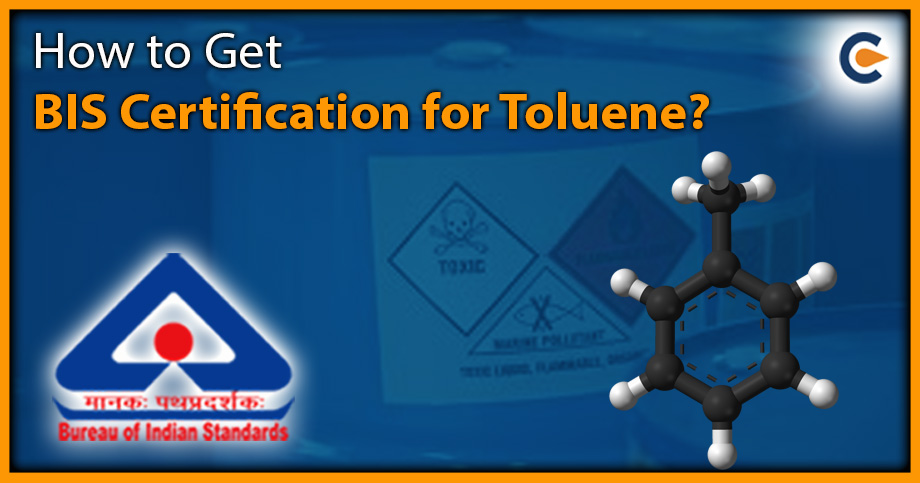Toluene is a high-demanding colourless liquid used as a solvent in many industries. It is also acknowledged as methylbenzene or toluol. Despite being highly flammable, it adheres to a sweet and pungent odour. Toluene has extended applicability as it is used in various industries such as paints, adhesives, rubbers, plastics, drugs, and fuel. The handling of Toluene requires utmost care because it can pose several health-related risks. Owing to the wides-spread demand and applicability, every Toluene manufacturer must secure the BIS certification prior to its production. Let’s see how you can apply for BIS certification for Toluene.
An Overview of Indian Standard called IS537:2011
IS537:2011 is an Indian Standard that specifies the sampling and testing requirements for Toluene. It is widely used as a key raw material for the production of nitrated, alkylated, and halogenated organic intermediates. It is also widely used as a solvent in formulating adhesives, coatings, inks, and paints. The material should adhere to the specs cited in the standard.
The standard also recommends manufacturers perform the following tests to establish the desirable quality of the Toulene.
- Non-Aromatic Hydrocarbons test
- Hydrogen Sulphide and Sulphur dioxide test
- Sulphur Content test
- Distillation Range test
- Relative Density test
Marking and Packaging Norms under IS537:2011
IS537:2011 also pens down marking as well as packing norms for the Toulene. The manufacturer must follow the buyer’s direction when it comes to the packaging.
All containers in which Toulene is proposed to be packed must be hygienic, leakproof, dry, and free of toluene-soluble compounds. The overall packaging should be aptly sealed and the material should be kept in a cool environment.
Each package or container should bear the marking reflecting the information as mentioned in the standard.
Adhering to the norms of this standard, the authority may approve the product to bear the ISI marking. However, that is not possible unless the manufacturer confirms that the product has met all the norms.
The Manufacturer must secure a BIS license from the BIS (Bureau of Indian Standards) to use the ISI marking. The BIS accords a license only after conducting a thorough inspection of the following:
- Manufacturing infrastructure
- Quality control
- Testing capabilities
- Production process
Let’s proceed to the next section which talks about the document requirements for BIS certification.
What documents are required for BIS certification for Toulene?
Documentation is a pivotal role in every certification process and BIS registration is no different. Here are some of the key paperwork that you will need to arrange for BIS certification:
1. Application Form:
You will require to fill out the application under the ISI marking scheme on the BIS portal[1]. The application requires the applicant to render various details relating to production, products, testing lab, certification in use, and so on.
2. Test Reports
You have to share a test report reflecting product quality with the authority along with the application form.
3. Manufacturing Unit Details:
You must share details concerning your production unit, its location, size, and capacity.
4. Quality Control Manual:
You must submit a quality control manual that helps the workforce to work in synergy and curtail production lags to meet desirable product quality.
5. List of Raw Materials:
You must share what type of raw materials is used for the production of the product in question. Also, furnish detail about the supplier of the raw materials.
6. Production Process Flowchart:
A process flowchart is a diagrammatic representation of how the production of Toulene takes place. It should be as extensive as possible.
7. Trademark Registration Certificate:
If you have a trademark registration, you must share it with the authority.
The list above may be subject to change depending on the type of product and available compliance. Therefore, it is better to avail of professional assistance in such a case.
A Step-by-Step Guide to Obtaining BIS Certification for Toluene
The detailed process to obtain BIS certification for Toluene is as follows:
1. Application submission
Submit an application for BIS certification for Toluene on the BIS website. You will need to furnish information such as the name and address of the manufacturer, product specs, and test reports.
2. Document Verification
The BIS authorities shall inspect the application and paperwork for any non-conformity or error. The authority might also pay an on-site visit to discover how the manufacturer is complying with underlying norms.
3. Testing
Once the paperwork is approved, the authority will collect some specified samples of Toluene for lab testing. The samples will be tested for quality in line with the methods cited in the standard.
4. Inspection
The test completion will lead to the inspection phase in which the authority will vet the entire premise for compliance.
5. Certification
If your product meets all the norms, you will be awarded the BIS certification for Toluene. The certificate will be valid for two years.
Note that the specific norms and procedures may vary depending on the type of product and compliances. It is advisable to get in touch with a BIS consultant or expert for thorough guidance.
Conclusion
In conclusion, BIS certification is vitally imperative for businesses that manufacture listed products in India. It not only ensures that your products adhere to mandatory quality and safety norms but also helps you avert legal hindrances.
Obtaining BIS certification for Toluene, or any other product, requires thoughtful planning, correct paperwork, and compliance with the BIS norms. Therefore, it is better to consult a BIS consultant to guide you navigate the process and ensure that your products conform to underlying standards. By securing BIS certification, you can reap various benefits such as amplified credibility, customer trust, and business growth.
Read our Article:How To Get BIS Certification For High Alumina Refractory Cement?













